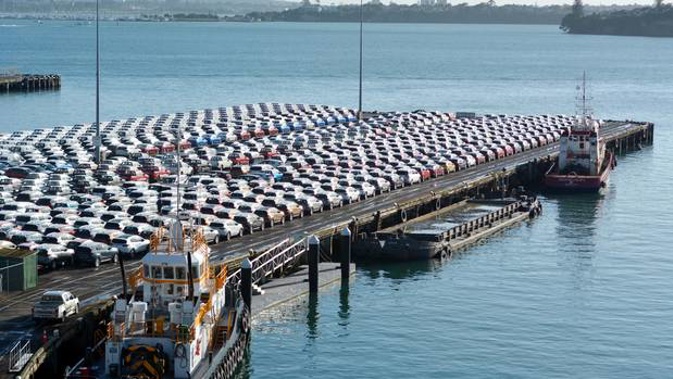
COMMENT:
As a Wellingtonian, I used to laugh at Auckland's failure to build a stadium on the waterfront and prospects for a vehicle storage facility (a glorified name for a carpark) on prime waterfront land to store imported cars.
It reinforced how lucky Wellington was to have a stadium close to the CBD and a great waterfront.
Now I spend more and more time in Auckland, such issues no longer bring a chuckle, they bring a grimace.
Why don't we just bring in vehicles destined for Auckland (and Northland), into the Ports of Auckland (POA) rather than the 70-odd per cent of vehicles destined for places across the country as it stands now?
Given New Zealand's size, lack of real scale, the realities of Auckland being New Zealand's one true super-city (apologies Wellington) and associated economies of scale across the imported vehicle supply chain (processing, compliance etc), it's hardly surprising to see POA have around 70 per cent share of the imported vehicle market.
The lion's share of vehicles are channelled through POA, processed and then distributed, into Auckland and more broadly across the North Island.
Unfortunately, there are costs and problems.
Congestion issues mean waiting times for ships and less berth availability for cruise ships.
Vehicles can spend days on the wharf and such delays impact transport operators, the supply chain, and the end customer.
Vehicles need to be transported and this puts more vehicles on Auckland's congested roads.
This will get worse as Auckland and the vehicle fleet grows.
Storage facility land (the wharf, Penrose-Mount Wellington, Wiri-Drury) is expensive.
Is a vehicle storage facility really the optimal use of waterfront land?
Economic theory says let the market prevail.
If there is a better and more efficient way of doing things, then surely the market will work it out.
There are numerous problems with that approach.
The free market might work it out in the long run, but as a notable economist once said, in the long run we are all dead.
Game theory (a realm of economics) tells us that when self-interest dominates group interest, we end up with an inferior outcome.
A 70 per cent share of the imported vehicles might help POA financials, but the costs are material to ratepayers if the best that can be done with prime land is to build a storage facility and congestion leads to inefficiency.
The Port Companies Act provides: "The principal objective of every port company shall be to operate as a successful business".
And to be as profitable and efficient as comparable businesses not owned by the Crown. A carpark on prime land. The economics on that would be interesting to see.
The issue has been looked at.
The New Zealand Institute of Research (NZIER) was commissioned to evaluate the costs and benefits of moving vehicle import operations from POA to another location.
Their research supported the status quo. POA was assessed as the most efficient vehicle import centre.
Channelling the vehicles through Northport or the Port of Tauranga (POT) was assessed to have more costs than benefits, the main cost being transport costs.
The net cost of alternatives (POT or Northport) was assessed to be around $1 billion in both instances over 30-odd years.
Such reports are easy to pick holes in as they are dependent on the assumption used, and this one is no different. Picking holes is splitting hairs as to the big picture though.
Sometimes you just need to step back and use common sense.
Of course, bringing vehicles into Tauranga and transporting them back to Auckland for processing/compliance before being redistributed around Auckland and other parts of New Zealand would have more costs. Cartage costs money. You don't need to be a genius to come to that conclusion.
It was surprising that a half-way house or common sense solution was not looked at.
Why not just bring vehicles destined for Auckland (and probably Northland), into POA? Send the other 30-odd per cent that currently go into POA, into Tauranga, including those vehicles ultimately destined for the Waikato.
Most of the identified "costs" in the NZIER report would disappear.
It's cheaper to transport vehicles to the Waikato from Tauranga rather than Auckland. There wouldn't be ship berthing delays given POT's capacity and berthing spots, which is an efficiency gain.
Vehicle distribution costs ex-Tauranga into the broader north island region would likely be lower. Congestion issues at POA would reduce leaving more space for cruise ships. It would remove some trucks off congested Auckland roads.
Hamilton land costs are lower than Auckland for storing cars. This would release expensive South Auckland land for other uses. It would free up waterfront land for hotels, restaurants and other developments.
So where are the holes?
Shipping logistics would need to change for the scale of vehicles to be delivered into Tauranga. That's already starting to take place. Ships carrying vehicles already go to Tauranga, and after a stop in Auckland.
There would be some supply chain duplication with Auckland in Tauranga/Hamilton for the processing of vehicles.
We already have duplication in Wellington and Christchurch given the scale of vehicle imports into those centres. Duplication would hardly be less efficient by the time Auckland transport congestion is taken into account.
What about additional infrastructure costs for Hamilton or Tauranga? These do not look to be large as POT is already set up to land vehicles and has oodles of space. POT is better placed to cope with projected growth in imported vehicles.
The "market" is likely to deliver a pragmatic outcome over time.
Sometimes the market needs to be given a nudge in the right direction though.
What large city has a carpark or a storage facility on prime waterfront land?
- Cameron Bagrie is the managing director of Bagrie Economics.
Take your Radio, Podcasts and Music with you









